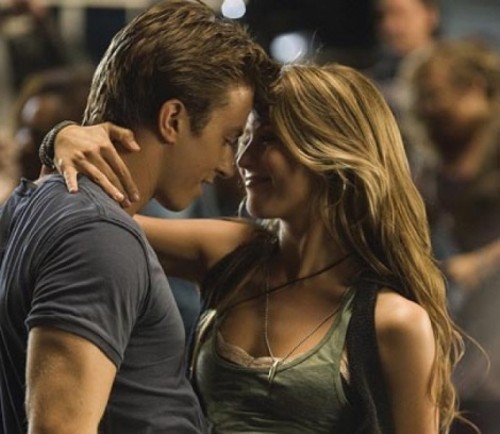You probably weren’t expecting a profound existential enigma in the new Footloose, co-writer/director Craig Brewer’s remake of the affectionately remembered 1984 youth-empowerment cheese-with-Bacon burger. Nevertheless, it is there. During the opening credits sequence, characters in the film dance and sing along to Kenny Loggins’ familiar theme song. Later, other characters pop in a tape of Deniece Williams’ version of “Let’s Hear It for the Boy.” The people in the 2011 Footloose clearly live in a world in which the 1984 version of Footloose exists—with no apparent self-awareness that they’re re-living the exact same story.
The fidelity with which Brewer attempts to reproduce the original Footloose is something rarely seen in contemporary remakes; in recent interviews, he described it as akin to a revival of a Broadway show. Brewer has concocted a 21st-century Footloose that’s mostly the 1984 Footloose with different actors. And by virtue of doing very little that’s different, he does a whole lot right.
There are a few minor tweaks. The automobile accident that inspires the small town of Bomont to enact its radical laws against loud music, dancing and other risky behaviors—only alluded to in the original—is depicted here at the outset. Ren McCormack (Kenny Wormald)—the newcomer from the big city—doesn’t move to Bomont with his single mother, but as a teenage orphan now staying with his uncle and aunt. But Ariel (Dancing With the Stars’ and Utah’s own Julianne Hough), the daughter of the town’s preacher (Dennis Quaid), is still a thrill-seeking rebel who’s soon interested in Ren. And Ren is still ultimately determined to shake up the town’s conservative status quo.
A few other noteworthy changes creep into the narrative, including abandoning the book-burning subplot entirely and switching the tractor chicken contest between Ren and Ariel’s boyfriend (Patrick John Flueger) into a demolition derby. And there are a few goofy variations on the original film’s iconic soundtrack, like turning “Holding Out for a Hero” into an acoustic ballad underscoring Ren’s mourning for his mother. Unlike Gus Van Sant’s Psycho, it’s not like you could play the copy in virtual side-by-side synchronization with the original.
But it’s pretty damned close. The opening credits still roll over a series of quick-stepping feet. Large chunks of dialogue and individual scenes are reproduced virtually verbatim. “Let’s Hear It for the Boy” still accompanies a montage of Ren teaching his pal Willard (Miles Teller) to dance, and “Dancing in the Sheets” still accompanies kids grooving at a drive-in, albeit with a little krumping added. Ren’s ride? Still a cream-colored Volkswagen Beetle. Ren’s formal attire? Still a maroon tuxedo jacket. Some classics never go out of style.
So why do it again if you’re going to do it the same? There is, of course, the simple reality that a different cast makes it inherently different, which can be simultaneously better (Hough is actually an improvement over the impeccably wooden Lori Singer), worse (dancer Wormald a significant step down from Kevin Bacon’s edgy insouciance) and the same (Quaid the perfect contemporary equivalent of John Lithgow as a solid actor who knows when to be a ham). And most of the changes Brewer does make are changes for the better, from providing a less-cartoonish foundation for the town’s alarmism to providing a stronger link between Ren and the minister in their mutual grief.
But mostly, it’s just a rare recognition that a satisfying, popular film story can be told again simply so that another generation can get an opportunity to enjoy it—and maybe so that their parents can wallow in a little nostalgia. Brewer makes no effort to modernize his setting—if there was a single cell phone in this Footloose, it was so unobtrusive that I can’t recall seeing it—or to provide a particular parallel with contemporary protective parenting, or include a winking cameo from the original cast. He just seems to have a sincere affection for this story that spills over into an appealing, energetic musical drama. His characters, perhaps paradoxically, exist in a world where Footloose is a cultural touchstone, because Brewer likes the idea of a world where Footloose is a cultural touchstone—one where you just want to get away from a place of oppressive expectations and yell out, “Let’s dance!”
FOOTLOOSE
Kenny Wormald, Julianne Hough, Dennis Quaid
Rated PG
More by Scott Renshaw
-
Film Reviews: New Releases for April 19
The Ministry of Ungentlemanly Warfare, Abigail, The Beast, Hard Miles, Sasquatch Sunset and more
- Apr 19, 2024
-
Faces of Salt Lake County book and portrait reception
Images and personal stories in a new book reveal local demographic diversity
- Apr 17, 2024
-
Feature film review: THE BEAST
A filmmaker's compelling ideas get a bit tangled in references to his creative influences.
- Apr 17, 2024
- More »
Latest in Film Reviews
Readers also liked…
-
Power Plays
Two satirical comedies explore manipulations and self-delusions by those with power.
- Aug 31, 2022





